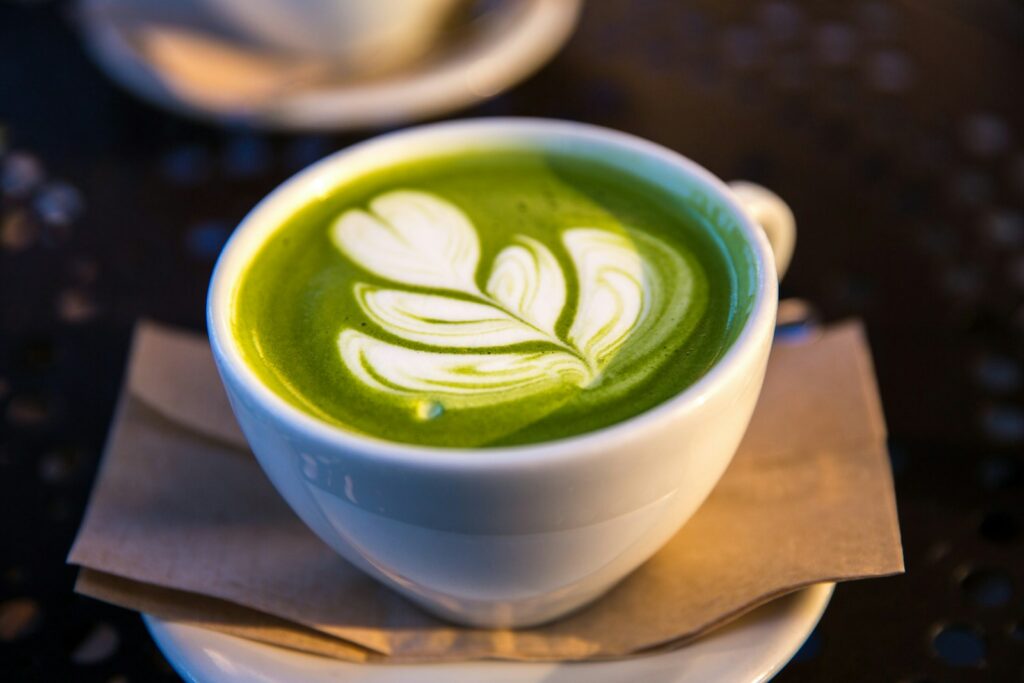Does Matcha Contain Caffeine? Find out the truth
Yes, matcha contains caffeine. This type of green tea, derived from the Camellia sinensis plant, typically holds more caffeine than other green teas due to its unique cultivation and preparation methods.
What is Matcha?
Matcha is a finely ground powder of specially grown and processed green tea leaves, traditionally consumed in Japan.
It’s known for its bright green color and has become popular worldwide for its distinctive flavor and health benefits.
Health Benefits of Matcha
Matcha is highly praised for its high antioxidant content, which can help protect against cell damage and potentially reduce the risk of chronic diseases.
These antioxidants include EGCG (epigallocatechin gallate), known for its cancer-fighting properties.
Caffeine Content in Matcha

How Much Caffeine Does Matcha Have?
Matcha contains between 19–44 mg of caffeine per gram. Given that a standard serving size for matcha is about 2–4 grams, a single cup could provide 38–176 mg of caffeine.
This amount can vary depending on the freshness of the powder and the method of preparation.
Comparison with Other Teas and Coffee
While an 8-ounce cup of coffee generally contains about 100 mg of caffeine, matcha can surpass this, especially if more powder is used.
Regular green tea typically contains less caffeine, ranging from 20–90 mg per cup.
Preparing Matcha: A Quick Guide
To enjoy a perfect cup of matcha, it’s important to use the right tools and technique. Here’s a simple method:
- Sift 2-4 grams (1/2-1 teaspoon) of matcha powder into a cup using a small sieve to avoid lumps.
- Add a small amount of hot water and whisk vigorously with a bamboo or regular whisk until foamy.
- Pour in the rest of the hot water and stir.
The Stimulating Effects of Caffeine in Matcha
Caffeine acts as a stimulant, enhancing alertness and energy levels. This makes matcha a popular choice for those seeking a quick boost of energy with matcha benefits.
Considering Caffeine Intake
It’s advisable not to exceed 400 mg of caffeine daily. Matcha drinkers should consider their total caffeine intake, especially if they consume other caffeinated products.
Making Matcha Part of Your Diet
Matcha can be a flavorful and energizing addition to your diet, but it’s important to monitor caffeine consumption to avoid potential side effects, especially if you are sensitive to stimulants.
DIY Matcha Latte
For a delicious twist, try making a matcha latte at home:
- Whisk a small amount of matcha with hot water until foamy.
- Add steamed milk of your choice (dairy or plant-based).
- Sweeten with maple syrup, honey, or brown sugar to taste.
Conclusion
Matcha is a unique, caffeine-containing beverage that offers more than just a caffeine kick. Its rich antioxidant profile and versatility in preparation make it a favored choice among tea lovers.
Whether you’re looking for a morning energizer or a soothing afternoon treat, matcha can be a delightful addition to your daily routine.
- Dunkin’ Donuts Secret Menu Surprises 2025 - January 31, 2025
- Starbucks’ Must-Try Secret Menu Creations for 2025 - January 31, 2025
- Tim Hortons Coffee Menu Explored 2025 - January 31, 2025
